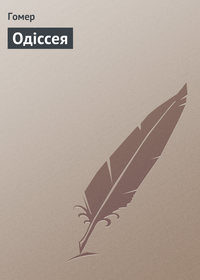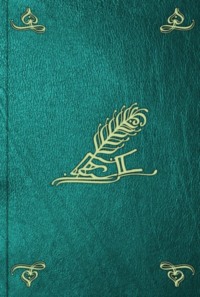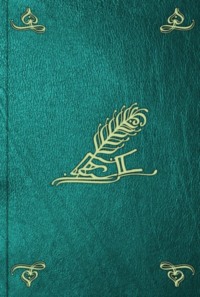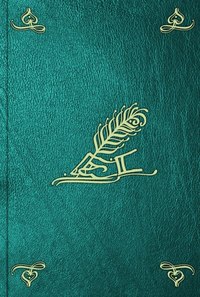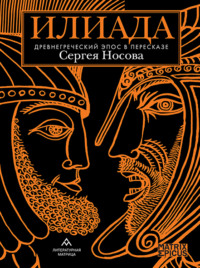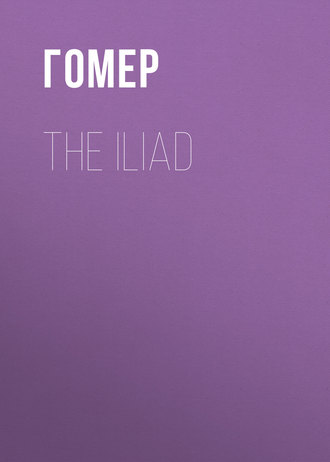 полная версия
полная версияThe Iliad
Thus spake he, and quickly Poseidon and Athene came near and stood beside him, in the likeness of men, and taking his hands in theirs pledged him in words. And the first that spake was Poseidon, Shaker of the earth: "Son of Peleus, tremble not, neither be afraid; such helpers of thee are we from the gods, approved of Zeus, even Pallas Athene and I, for to be vanquished of a river is not appointed thee, but he will soon give back, and thou wilt thyself perceive it: but we will give thee wise counsel, if thou wilt obey it; hold not thy hand from hazardous battle until within Ilios' famous walls thou have pent the Trojan host, even all that flee before thee. But do thou, when thou hast taken the life of Hector, go back unto the ships; this glory we give unto thee to win."
They having thus spoken departed to the immortals, but he toward the plain – for the bidding of gods was strong upon him – went onward; and all the plain was filled with water-flood, and many beautiful arms and corpses of slain youths were drifting there. So upward sprang his knees as he rushed against the stream right on, nor stayed him the wide-flowing River, for Athene put great strength in him. Neither did Skamandros slacken his fierceness, but yet more raged against the son of Peleus, and he curled crestwise the billow of his stream, lifting himself on high, and on Simoeis he called with a shout: "Dear brother, the strength of this man let us both join to stay, since quickly he will lay waste the great city of king Priam, and the Trojans abide not in the battle. Help me with speed, and fill thy streams with water from thy springs, and urge on all thy torrents, and raise up a great wave, and stir huge roaring of tree-stumps and stones, that we may stay the fierce man who now is lording it, and deeming himself match for gods. For neither, I ween, will strength avail him nor comeliness anywise, nor that armour beautiful, which deep beneath the flood shall be o'erlaid with slime, and himself I will wrap him in my sands and pour round him countless shingle without stint, nor shall the Achaians know where to gather his bones, so vast a shroud of silt will I heap over them. Where he dieth there shall be his tomb, neither shall he have need of any barrow to be raised, when the Achaians make his funeral."
He said, and rushed in tumult on Achilles, raging from on high, thundering with foam and blood and bodies of dead men. Then did a dark wave of the heaven-sprung River stand towering up and overwhelm the son of Peleus. But Hera cried aloud in terror of Achilles, lest the great deep-eddying River sweep him away, and straightway she called to Hephaistos, her dear son: "Rise, lame god, O my son; it was against thee we thought that eddying Xanthos was matched in fight. Help with all speed, put forth large blast of flame. Then will I go to raise a strong storm out of the sea of the west wind and the white south which shall utterly consume the dead Trojans and their armour, blowing the angry flame. Thou along Xanthos' banks burn up his trees and wrap himself in fire, nor let him anywise turn thee back by soft words or by threat, nor stay thy rage – only when I cry to thee with my voice, then hold the unwearying fire."
Thus spake she, and Hephaistos made ready fierce-blazing fire. First on the plain fire blazed, and burnt the many dead who lay there thick, slain by Achilles; and all the plain was parched and the bright water stayed. And as when in late summer the north wind swiftly parcheth a new watered orchard, and he that tilleth it is glad, thus was the whole plain parched, and Hephaistos consumed the dead; then against the river he turned his gleaming flame. Elms burnt and willow trees and tamarisks, and lotos burnt and rush and galingale which round the fair streams of the river grew in multitude. And the eels and fishes beneath the eddies were afflicted, which through the fair streams tumbled this way and that, in anguish at the blast of crafty Hephaistos. And the strong River burned, and spake and called to him by name: "Hephaistos, there is no god can match with thee, nor will I fight thee thus ablaze with fire. Cease strife, yea, let noble Achilles drive the Trojans forthwith out of their city; what have I to do with strife and succour?"
Thus spake he, burnt with fire, for his fair streams were bubbling. And as a cauldron boileth within, beset with much fire, melting the lard of some fatted hog spurting up on all sides, and logs of firewood lie thereunder, – so burned his fair streams in the fire, and the water boiled. He had no mind to flow, but refrained him, for the breath of cunning Hephaistos violently afflicted him. Then unto Hera, earnestly beseeching her,' he spake winged words: "Hera, wherefore hath thy son assailed my stream to vex it above others? I am less chargeable than all the rest that are helpers of the Trojans. But lo, I will give over, if thou wilt, and let thy son give over too. And I further will swear even this, that never will I ward the day of evil from the Trojans, not even when all Troy is burning in the blaze of hungry fire, and the warlike sons of Achaians are the burners thereof."
Then when the white-armed goddess Hera heard his speech, straightway she spake unto Hephaistos her dear son: "Hephaistos, hold, famed son; it befitteth not thus for mortals' sake to do violence to an immortal god."
Thus said she and Hephaistos quenched the fierce-blazing fire, and the wave once more rolled down the fair river-bed.
So when the rage of Xanthos was overcome, both ceased, for Hera stayed them, though in wrath. But among the other gods fell grievous bitter strife, and their hearts were carried diverse in their breasts. And they clashed together with a great noise, and the wide earth groaned, and the clarion of great Heaven rang around. Zeus heard as he sate upon Olympus, and his heart within him laughed pleasantly when he beheld that strife of gods. Then no longer stood they asunder, for Ares piercer of shields began the battle and first made for Athene with his bronze spear, and spake a taunting word: "Wherefore, O dogfly, dost thou match gods with gods in strife, with stormy daring, as thy great spirit moveth thee? Rememberest thou not how thou movedst Diomedes Tydeus' son to wound me, and thyself didst take a visible spear and thrust it straight at me and pierce through my fair skin? Therefore deem I now that thou shalt pay me for all that thou hast done."
Thus saying he smote on the dread tasselled aegis that not even the lightning of Zeus can overcome – thereon smote bloodstained Ares with his long spear. But she, giving back, grasped with stout hand a stone that lay upon the plain, black, rugged, huge, which men of old time set to be the landmark of a field; this hurled she, and smote impetuous Ares on the neck, and unstrung his limbs. Seven roods he covered in his fall, and soiled his hair with dust, and his armour rang upon him. And Pallas Athene laughed, and spake to him winged words exultingly: "Fool, not even yet hast thou learnt how far better than thou I claim to be, that thus thou matchest thy might with mine. Thus shalt thou satisfy thy mother's curses, who deviseth mischief against thee in her wrath, for that thou hast left the Achaians and givest the proud Trojan's aid."
Thus having said she turned from him her shining eyes. Him did Aphrodite daughter of Zeus take by the hand and lead away, groaning continually, for scarce gathered he his spirit back to him. But when the white-armed goddess Hera was aware of them, straightway she spake unto Athene winged words: "Out on it, child of aegis-bearing Zeus, maiden invincible, lo there the dogfly is leading Ares destroyer of men out of the fray of battle down the throng – nay then, pursue her."
She said, and Athene sped after her with heart exultant, and made at her and smote her with stout hand upon the breast, and straightway her knees and heart were unstrung. So they twain lay on the bounteous earth, and she spake winged words exultingly: "Such let all be who give the Trojans aid when they fight against the mailed Argives. Be they even so bold and brave as Aphrodite when she came to succour Ares and defied my might. Then should we long ago have ceased from war, having laid waste the stablished citadel of Ilios."
[She said, and the white-armed goddess Hera smiled.] Then to Apollo spake the earth-shaking lord: "Phoebus, why stand we apart? It befitteth not after the rest have begun: that were the more shameful if without fighting we should go to Olympus to the bronze-thresholded house of Zeus. Begin, for thou art younger; it were not meet for me, since I was born first and know more. Fond god, how foolish is thy heart! Thou rememberest not all the ills we twain alone of gods endured at Ilios, when by ordinance of Zeus we came to proud Laomedon and served him through a year for promised recompense, and he laid on us his commands. I round their city built the Trojans a wall, wide and most fair, that the city might be unstormed, and thou Phoebus, didst herd shambling crook-horned kine among the spurs of woody many-folded Ida. But when the joyous seasons were accomplishing the term of hire, then redoubtable Laomedon robbed us of all hire, and sent us off with threats. He threatened that he would bind together our feet and hands and sell us into far-off isles, and the ears of both of us he vowed to shear off with the sword. So we went home with angry hearts, wroth for the hire he promised and gave us not. To his folk not thou showest favour, nor essayest with us how the proud Trojans may be brought low and perish miserably with their children and noble wives."
Then to him answered King Apollo the Far-darter: "Shaker of the earth, of no sound mind wouldst thou repute me if I should fight against thee for the sake of pitiful mortals, who like unto leaves now live in glowing life, consuming the fruit of the earth, and now again pine into death. Let us with all speed cease from combat, and let them do battle by themselves."
Thus saying he turned away, for he felt shame to deal in blows with his father's brother. But his sister upbraided him sore, the queen of wild beasts, huntress Artemis, and spake a taunting word: "So then thou fleest, Far-darter, hast quite yielded to Poseidon the victory, and given him glory for naught! Fond god, why bearest thou an ineffectual bow in vain? Let me not hear thee again in the halls of our sire boast as before among the immortal gods thou wouldst stand up to fight against Poseidon."
Thus spake she, but far-darting Apollo answered her not. But angrily the noble spouse of Zeus [upbraided the Archer Queen with taunting words: ] "How now art thou fain, bold vixen, to set thyself against me? Hard were it for thee to match my might, bow-bearer though thou art, since against women Zeus made thee a lion, and giveth thee to slay whomso of them thou wilt. Truly it is better on the mountains to slay wild beasts and deer than to fight amain with mightier than thou. But if thou wilt, try war, that thou mayest know well how far stronger am I, since thou matchest thy might with mine."
She said, and with her left hand caught both the other's hands by the wrist, and with her right took the bow from off her shoulders, and therewith, smiling, beat her on the ears as she turned this way and that; and the swift arrows fell out of her quiver. And weeping from before her the goddess fled like a dove that from before a falcon flieth to a hollow rock, a cleft – for she was not fated to be caught; – thus Artemis fled weeping, and left her bow and arrows where they lay. Then to Leto spake the Guide, the slayer of Argus: "Leto, with thee will I no wise fight; a grievous thing it is to come to blows with wives of cloud-gathering Zeus; but boast to thy heart's content among the immortal gods that thou didst vanquish me by might and main."
Thus said he, and Leto gathered up the curved bow and arrows fallen hither and thither amid the whirl of dust: so taking her daughter's bow she went back. And the maiden came to Olympus, to the bronze-thresholded house of Zeus, and weeping set herself on her father's knee, while round her her divine vesture quivered: and her father, Kronos' son, took her to him and asked of her, laughing gently: "Who of the inhabitants of heaven, dear child, hath dealt with thee thus [hastily, as though thou hadst been doing some wrong thing openly]?"
And to him in answer spake the fair-crowned queen of the echoing chase: "It was thy wife that buffeted me, father, the white-armed Hera, from whom are strife and contention come upon the immortals."
Thus talked they unto one another. Then Phoebus Apollo entered into sacred Ilios, for he was troubled for the wall of the well-builded city, lest the Danaans waste it before its hour upon that day. But the other ever-living gods went to Olympus, some angry and some greatly triumphing, and sat down beside Zeus who hideth himself in dark clouds.
Now Achilles was still slaying the Trojans, both themselves and their whole-hooved horses. And as when a smoke goeth up to the broad heaven, when a city burneth, kindled by the wrath of gods, and causeth toil to all, and griefs to many, thus caused Achilles toil and griefs to the Trojans. And the old man Priam stood on the sacred tower, and was aware of dread Achilles, how before him the Trojans thronged in rout, nor was any succour found of them. Then with a cry he went down from the tower, to rouse the gallant warders along the walls: "Hold open the gates in your hands until the folk come to the city in their rout, for closely is Achilles chasing them – now trow I there will be deadly deeds. And when they are gathered within the wall and are taking breath, then again shut back the gate-wings firmly builded; for I fear lest that murderous man spring in within the wall."
Thus spake he, and they opened the gates and thrust back the bolts; and the gates flung back gave safety. Then Apollo leapt forth to the front that he might ward destruction from the Trojans. They straight for the city and the high wall were fleeing, parched with thirst and dust-grimed from the plain, and Achilles chased them vehemently with his spear, for strong frenzy possessed his heart continually, and he thirsted to win him renown. Then would the sons of the Achaians have taken high-gated Troy, had not Phoebus Apollo aroused goodly Agenor, Antenor's son, a princely man and strong. In his heart he put good courage, and himself stood by his side that he might ward off the grievous visitations of death, leaning against the oak, and he was shrouded in thick mist. So when Agenor was aware of Achilles waster of cities, he halted, and his heart much wavered as he stood; and in trouble he spake to his great heart: "Ay me, if I flee before mighty Achilles, there where the rest are driven terror-struck, nathless will he overtake me and slaughter me as a coward. Or what if I leave these to be driven before Achilles the son of Peleus, and flee upon my feet from the wall by another way to the Ileian plain, until I come to the spurs of Ida, and hide me in the underwood? So then at evening, having bathed in the river and refreshed me of sweat, I might return to Ilios. Nay, why doth my heart debate thus within me? Lest he might be aware of me as I get me from the city for the plain, and speeding after overtake me with swift feet; then will it no more be possible to avoid the visitation of death, for he is exceeding mighty above all mankind. What then if in front of the city I go forth to meet him? Surely his flesh too is penetrable by sharp bronze, and there is but one life within, and men say he is mortal, howbeit Zeus the son of Kronos giveth him renown."
Thus saying, he gathered himself to await Achilles, and within him his stout heart was set to strive and fight. As a leopardess goeth forth from a deep thicket to affront a huntsman, nor is afraid at heart, nor fleeth when she heareth the bay of hounds; for albeit the man first smite her with thrust or throw, yet even pierced through with the spear she ceaseth not from her courage until she either grapple or be slain, so noble Antenor's son, goodly Agenor, refused to flee till he should put Achilles to the proof, but held before him the circle of his shield, and aimed at him with his spear, and cried aloud: "Doubtless thou hopest in thy heart, noble Achilles, on this day to sack the city of the proud men of Troy. Fond man, there shall many woful things yet be wrought before it, for within it we are many men and staunch, who in front of our parents dear and wives and sons keep Ilios safe; but thou shalt here meet death, albeit so redoubtable and bold a man of war."
He said, and hurled his sharp spear with weighty hand, and smote him on the leg beneath the knee, nor missed his mark, and the greave of new-wrought tin rang terribly on him; but the bronze bounded back from him it smote, nor pierced him, for the god's gift drave it back. Then the son of Peleus in his turn made at godlike Agenor, but Apollo suffered him not to win renown, but caught away Agenor, and shrouded him in thick mist, and sent him in peace to be gone out of the war. Then by wile kept the son of Peleus away from the folk, for in complete semblance of Agenor himself he stood before the feet of Achilles, who hasted to run upon him and chase him. And while he chased him over the wheat-bearing plain, edging him toward the deep-eddying river Skamandros, as he ran but a little in front of him (for by wile Apollo beguiled him that he kept ever hoping to overtake him in the race), meantime the other Trojans in common rout came gladly unto their fastness, and the city was filled with the throng of them. Neither had they heart to await one another outside the city and wall, and to know who might have escaped and who had perished in the fight, but impetuously they poured into the city, whomsoever of them his feet and knees might save.
BOOK XXII
How Achilles fought with Hector, and slew him, and brought his body to the ships.
Thus they throughout the city, scared like fawns, were cooling their sweat and drinking and slaking their thirst, leaning on the fair battlements, while the Achaians drew near the wall, setting shields to shoulders. But Hector deadly fate bound to abide in his place, in front of Ilios and the Skaian gates. Then to the son of Peleus spake Phoebus Apollo: "Wherefore, son of Peleus, pursuest thou me with swift feet, thyself being mortal and I a deathless god? Thou hast not even yet known me, that I am a god, but strivest vehemently. Truly thou regardest not thy task among the affliction of the Trojans whom thou affrightedst, who now are gathered into the city, while thou heat wandered hither. Me thou wilt never slay, for I am not subject unto death."
Then mightily moved spake unto him Achilles fleet of foot: "Thou hast baulked me, Far-darter, most mischievous of all the gods, in that thou hast turned me hither from the wall: else should full many yet have bitten the dust or ever within Ilios had they come. Now hast thou robbed me of great renown, and lightly hast saved them, because thou hadst no vengeance to fear thereafter. Verily I would avenge me on thee, had I but the power."
Thus saying toward the city he was gone in pride of heart, rushing like some victorious horse in a chariot, that runneth lightly at full speed over the plain; so swiftly plied Achilles his feet and knees. Him the old man Priam first beheld as he sped across the plain, blazing as the star that cometh forth at harvest-time, and plain seen his rays shine forth amid the host of stars in the darkness of night, the star whose name men call Orion's Dog. Brightest of all is he, yet for an evil sign is he set, and bringeth much fever upon hapless men. Even so on Achilles' breast the bronze gleamed as he ran. And the old man cried aloud and beat upon his head with his hands, raising them on high, and with a cry called aloud beseeching his dear son; for he before the gates was standing, all hot for battle with Achilles. And the old man spake piteously unto him, stretching forth his hands: "Hector, beloved son, I pray thee await not this man alone with none beside thee, lest thou quickly meet thy doom, slain by the son of Peleus, since he is mightier far, a merciless man. Would the gods loved him even as do I! then quickly would dogs and vultures devour him on the field – thereby would cruel pain go from my heart – the man who hath bereft me of many valiant sons, slaying them and selling them captive into far-off isles. Ay even now twain of my children, Lykaon and Polydoros, I cannot see among the Trojans that throng into the fastness, sons whom Laothoe bare me, a princess among women. If they be yet alive amid the enemy's host, then will we ransom them with bronze and gold, for there is store within, for much goods gave the old man famous Altes to his child. If they be dead, then even in the house of Hades shall they be a sorrow to my soul and to their mother, even to us who gave them birth, but to the rest of the folk a briefer sorrow, if but thou die not by Achilles' hand. Nay, come within the wall, my child, that thou preserve the men and women of Troy, neither give great triumph to the son of Peleus, and be thyself bereft of sweet life. Have compassion also on me, the helpless one, who still can feel, ill-fated; whom the father, Kronos' son, will bring to naught by a grievous doom in the path of old age, having seen full many ills, his sons perishing and his daughters carried away captive, and his chambers laid waste and infant children hurled to the ground in terrible war, and his sons' wives dragged away by the ruinous hands of the Achaians. Myself then last of all at the street door will ravening dogs tear, when some one by stroke or throw of the sharp bronze hath bereft my limbs of life – even the dogs I reared in my halls about my table and to guard my door, which then having drunk my blood, maddened at heart shall lie in the gateway. A young man all beseemeth, even to be slain in war, to be torn by the sharp bronze and lie on the field; though he be dead yet is all honourable to him, whate'er be seen: but when dogs defile the hoary head and hoary beard of an old man slain, this is the most piteous thing that cometh upon hapless men."
Thus spake the old man, and grasped his hoary hairs, plucking them from his head, but he persuaded not Hector's soul. Then his mother in her turn wailed tearfully, loosening the folds of her robe, while with the other hand she showed her breast; and through her tears spake to him winged words: "Hector, my child, have regard unto this bosom and pity me, if ever I gave thee consolation of my breast. Think of it, dear child, and from this side the wall drive back the foe, nor stand in front to meet him. He is merciless; if he slay thee it will not be on a bed that I or thy wife shall bewail thee, my own dear child, but far away from us by the ships of the Argives will swift dogs devour thee."
Thus they with wailing spake to their dear son, beseeching him sore, yet they persuaded not Hector's soul, but he stood awaiting Achilles as he drew nigh in giant might. As a serpent of the mountains upon his den awaiteth a man, having fed on evil poisons, and fell wrath hath entered into him, and terribly he glared as he coileth himself about his den, so Hector with courage unquenchable gave not back, leaning his shining shield against a jutting tower. Then sore troubled he spake to his great heart: "Ay me, if I go within the gates and walls, Polydamas will be first to bring reproach against me, since he bade me lead the Trojans to the city during this ruinous night, when noble Achilles arose. But I regarded him not, yet surely it had been better far. And now that I have undone the host by my wantonness, I am ashamed before the men of Troy and women of trailing robes, lest at any time some worse man than I shall say: 'Hector by trusting his own might undid the host.' So will they speak; then to me would it be better far to face Achilles and either slay him and go home, or myself die gloriously before the city. Or what if I lay down my bossy shield and my stout helm, and lean my spear against the wall, and go of myself to meet noble Achilles and promise him that Helen, and with her all possessions that Alexandros brought in hollow ships to Troy, the beginning of strife, we will give to the Sons of Atreus to take away, and therewithal to divide in half with the Achaians all else that this city holdeth: and if thereafter I obtain from the Trojans an oath of the Elders that they will hide nothing but divide all in twain [whatever wealth the pleasant city hold within]? But wherefore doth my heart debate thus? I might come unto him and he would not pity or regard me at all, but presently slay me unarmed as it were but a woman, if I put off my armour. No time is it now to dally with him from oaktree or from rock, like youth with maiden, as youth and maiden hold dalliance one with another. Better is it to join battle with all speed: let us know upon which of us twain the Olympian shall bestow renown."


